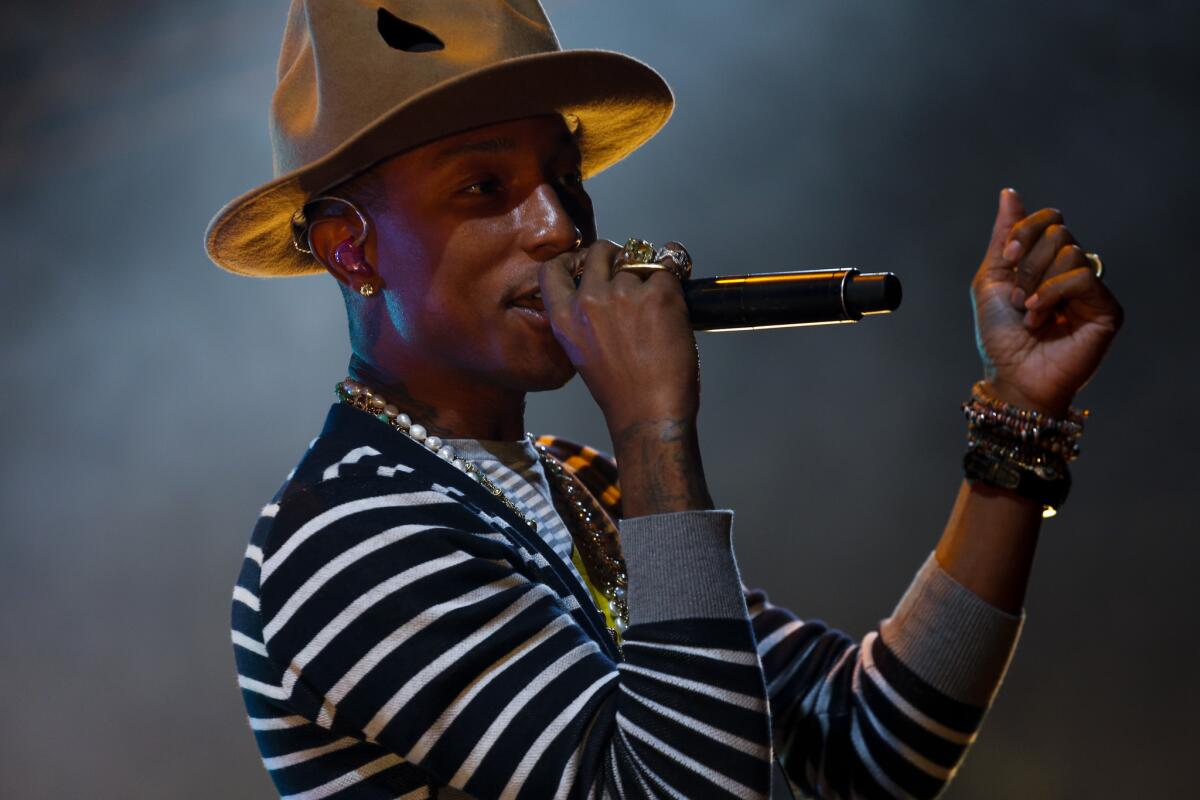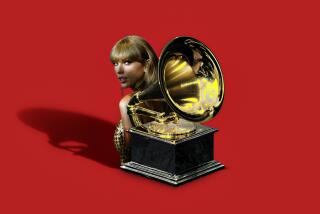Critic’s Notebook: I Heart Radio Music Awards? It’s hard to not be profoundly skeptical

- Share via
With the arrival Thursday night of yet another prime-time music awards show, the first I Heart Radio Music Awards, comes an album’s worth of questions.
Do networks and popular music decision-makers think the only way for the American public to appreciate music is via competition? Is the inherent drama of thrilling hooks, choruses or lyrics charismatically presented live on a huge national platform less exciting without the manufactured drama of awards, singing competitions and reality shows? Most viewers watch these ceremonies and competitions not for the trophies but for the performances and fashions anyway. So why the tired us-versus-them conceit?
This production, which purports to celebrate the “true groundbreakers in today’s music,” will hand out honors based on voting on Facebook, Twitter and Instagram as well as feature pre-recorded and live performances by artists including Drake, Pharrell, Blake Shelton, Thirty Seconds to Mars, Arcade Fire and others.
Ferried into existence by Clear Channel — America’s largest owner of terrestrial radio stations — through its I Heart Radio Internet radio platform, the event will celebrate hit makers in categories including song of the year, best new artist, best collaboration and genre-specific awards for country, alternative rock, hip-hop/R&B and EDM.
Sound familiar? So do the “groundbreakers,” which include Rihanna, Justin Timberlake, Macklemore & Ryan Lewis, Florida Georgia Line, Pitbull, Luke Bryan, Blake Shelton, Miley Cyrus and Avicii. All are chart toppers whose music has received airplay on the historically conservative, formerly Bain Capital-owned Clear Channel Communications.
Even before it airs on NBC, the two-hour “ceremony” seems less a celebration than a synergistic infomercial. The I Heart Radio platform, after all, is a major initiative for Clear Channel. Launched in 2008, it offers streaming access to over 800 of the company’s 1,200 radio stations and a catalog of 11 million songs and is available for use on smartphones, game consoles and streaming devices such as Roku and Sonos. Envisioned as a means to diversify its broadcast offerings in the digital age, the app seeks to stanch the loss in listeners caused by the rise of music services such as Spotify, Pandora and YouTube, all of which have eaten into Clear Channel’s once monolithic market share.
The I Heart Radio Music Awards join a mass of similarly intentioned, second-tier productions glutting the airwaves between Grammy Awards telecasts. They include the Billboard Music Awards, the American Music Awards, MTV’s Video Music Awards, the Teen Choice Awards, the YouTube Awards and a variety of genre-specific annual ceremonies. Think the awards matter to anyone other than those with money to earn? Quick, name the winner of the AMAs’ “single of the year” in 2013.
It’s hard not to be profoundly skeptical: yet one more media event serving to dilute prime time with quasi-drama by tapping into our primal affection for organized noise. The goal seems less about actually honoring hit makers than to trend on social media for a few hours. The collateral damage is to further diminish the value of “awards” in general. The more there are, the less they mean.
Add in a furrowed brow for I Heart Radio’s batch of nominees due to its “best lyrics” category, which includes nods to work by Miley Cyrus, Icona Pop, Avicii, Macklemore & Ryan Lewis and A Great Big World (feat. Christina Aguilera). Whether or not you agree that the words to the last of these — “Say something I’m giving up on you/ I’m sorry that I couldn’t get to you/ Anywhere I would have followed you” — are worthy of honor, it should be noted that at least A Great Big World wrote it themselves. Two of the nominees, Miley Cyrus and Icona Pop, didn’t even pen the lyrics for which they may be honored.
I’m all for as many hours of prime-time viewing for music as possible, but at this point the “awards” conceit reveals a lack of imagination by producers to deliver music performance and discovery in prime time. Network television doesn’t have a regular showcase of live music, something similar to England’s excellent weekly series “Later … With Jools Holland.” Though it may be true that it wouldn’t fly here in prime time, such a celebration might work as a seasonal special, a kind of “Now That’s What I Call Music” for the social media age.
Late-night talk shows and “Saturday Night Live” continue to produce their share of exciting viral moments, especially now that younger hosts such as Jimmy Fallon and Jimmy Kimmel are pushing more adventurous music. The winning moments, in fact, are legion. The fact none was accompanied by a shiny trophy didn’t diminish the thrills one bit.
More to Read
The biggest entertainment stories
Get our big stories about Hollywood, film, television, music, arts, culture and more right in your inbox as soon as they publish.
You may occasionally receive promotional content from the Los Angeles Times.









